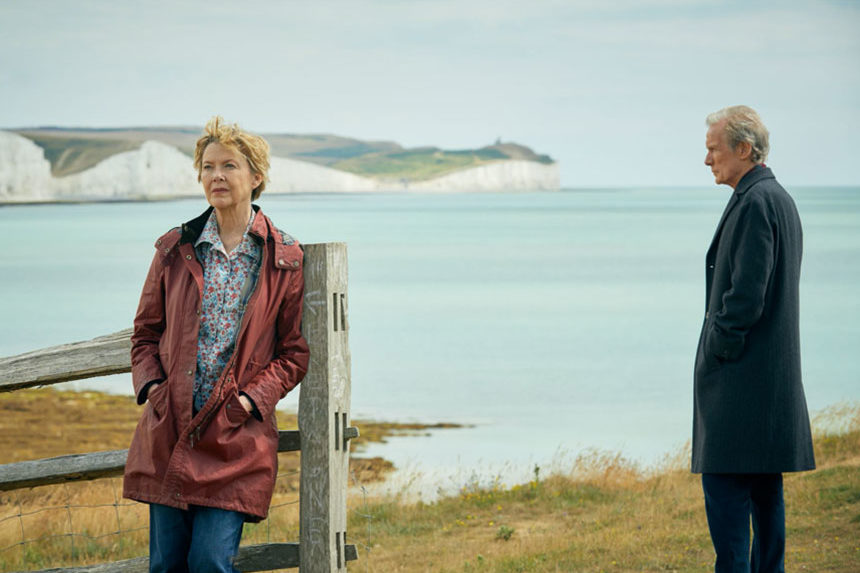Hope Gap
⭐ ⭐ ⭐ ⭐
Rating: PG-13
Run Time: 1 hour 40 minutes
Stars: Annette Bening, Bill Nighy, Josh O’Connor
Writer/Director: William Nicholson
You might consider Hope Gap a bookend to last year’s A Marriage Story: that Oscar-winning domestic drama was a portrait of a marriage exploding like a white-hot supernova — while Hope Gap depicts one that has dwindled to a dwarf star, collapsing under its own weight and drifting off, almost invisible, into the darkness of space.
Two of the screen’s finest actors — Annette Bening and Bill Nighy — are Edward and Grace, a British couple whose mundane daily routine seems as unshakeable as the stately white cliffs that tower above their coastal town in the South of England. He’s a history teacher; she’s an editor of poetry, and despite whatever warmth they once shared, today their most intimate exchanges seem to involve him heating water for her tea.
Day after day, she sits at her end of their cottage poring over poems while he sits at his end updating and correcting Wikipedia pages related to Napoleon’s retreat from Waterloo.
In fact, the script by writer/director William Nicholson (Gladiator, Unbroken, Les Miserables) frequently returns to the cold, brutal imagery of Napoleon’s defeat. Edward relates in grisly detail how the devastated army’s survivors scavenged off the dead and dying in order to survive — and he draws some awful parallel between that grisly chapter of history and his own crumbling marriage.
Weirdly, although she’s aware that her marriage has all the excitement of yesterday’s black pudding, Grace is oblivious to the fact that the relationship is on life support — and has in fact flat-lined. When Edward breaks the news that he’s leaving her for another woman, Grace stares at him dumbly, as if he’s speaking some unknown foreign language. And when the reality of the situation finally begins to sink in, her state of denial extends all the way to the settlement meeting at the office of Edward’s lawyer, where she continues to profess her love and the belief that they can put all this unpleasantness behind them.
Bening continues — impossibly as it may seem — to hone her art of screen acting by subtraction. With a dip of the voice, a dart of the eyes, an almost imperceptible slump of the shoulders, Bening conveys unspoken volumes of Grace’s inner workings. In the course of a single sentence she ricochets from hope to despair, then back to hope again, because that is the only place she can survive without following her impulse to take one long, final walk to the precipice of those white cliffs just outside of town.
Needless to say, Hope Gap is no laugh fest — the tone at times threatens to remain as gloomy as the skies above the English Channel. The occasional laughs come from Grace’s flailing attempts at rebuilding her life, particularly when she gets a puppy that she names, of course, Edward. “Stay, Eddie!” she snaps — and she smiles with satisfaction when this Edward, at least, does what she says.
Nighy has the more difficult role here — we want to share Grace’s ultimate assessment that Edward is a heartless scoundrel, and he does very little verbally to try and talk us out of it. But to dismiss him would make the drama infinitely less compelling, and Nighy refuses to offer that bait. Wispy as a willow — we almost fear he’ll blow away during a walk on the beach with his concerned son (Josh O’Connor, now starring as Prince Charles on The Crown) — Edward is almost a caricature of the ultra-repressed, defiantly distant British male, John Cleese without the laughs. Yet Edward is so obviously sad in so many ways — ways that long pre-date his marriage 29 years earlier — that we do long for him to find whatever he can define in his heart as happiness.
In a heart-stopping encounter with Grace, Edward’s new love (Sally Rogers) expresses the matter in a stark kind of calculus that recalls the hard choices made by Napoleon’s freezing soldiers: “The way I see it,” she says, “there were three unhappy people. Now there’s just one.”
For Edward, the wall of stoicism cracks only slightly in conversation with his son, relaying the two moments in his life when he fell in love: first with Grace, and later with the woman for whom he left her. Both are heartbreaking vignettes, and I found myself thinking of Shadowlands, written by this same screenwriter some 30 years ago. In that Oscar-nominated film, the British writer and theologian C.S. Lewis, played by Anthony Hopkins, finds his life of solitary dispassion cracked open by a vivacious, passionate American poet, unforgettably played by Debra Winger.
In that true story, a man allows himself to be changed for the better. The tragedy of Hope Gap is that the characters have long since changed for the worse and now remain unchanged and, in their inertia, ultimately incompatible.
Featured image: Annette Bening and Bill Nighy in Hope Gap. Photo by Robert Viglasky, courtesy of Roadside Attractions and Screen Media
Become a Saturday Evening Post member and enjoy unlimited access. Subscribe now



